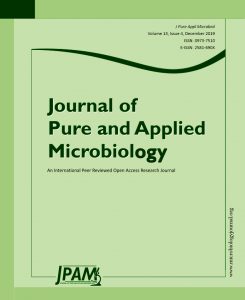Salmonella is the leading cause of foodborne disease and a public health concern. In this study, food samples were collected from fresh markets within northeastern Thailand. Antibiotic-resistant Salmonella were detected in fresh vegetables and fermented meat products. Of 172 collected food samples, 25 (14.53%) were contaminated with Salmonella resistant to at least 1 of 9 antibiotics. Eight strains of 7 serovars, including S. Derby, S. Paratyphi B, S. Stanley, S. Dabou, S. Rissen, S. Hvittingfoss, and S. Brenderup, were resistant to S, TE, CN, SXT, and NA, accounting for 20%, 16%, 12%, 12%, and 12% of all antibiotics, respectively. To determine the anti-Salmonella activity of lactic acid bacteria, Pediococcus pentosaceus PS34 isolated from fermented fish was selected from 5 strains of food-derived lactic acid bacteria according to the antibacterial and acid-resistance properties. When added to 3 log CFU/ml cultures of Salmonella, the PS34 cell-free supernatant (CFS) reduced the numbers of Salmonella after 1, 15, 30, and 60 minutes of incubation; the reduction reached 99.9% within 30 minutes. The minimal arbitrary inhibition concentration of freeze-dried PS34 CFS was a 1:4 dilution. With the exception of neutralization to pH 6.5, treatment with proteolytic enzymes and heating at 100°C and 120°C did not reduce the freeze-dried PS34 CFS anti-Salmonella activity, indicating that the extracellular PS34 bioactive substances were heat stable and highly effective against Salmonella in vitro. Thus, bioactive substances produced by P. pentosaceus PS34 have the potential to reduce the risk of antibiotic-resistant Salmonella from contaminated food reaching consumers.
Antibiotic-resistant Salmonella, Pediococcus pentosaceus, bioactive substance, fresh vegetable, fermented food.
© The Author(s) 2019. Open Access. This article is distributed under the terms of the Creative Commons Attribution 4.0 International License which permits unrestricted use, sharing, distribution, and reproduction in any medium, provided you give appropriate credit to the original author(s) and the source, provide a link to the Creative Commons license, and indicate if changes were made.


